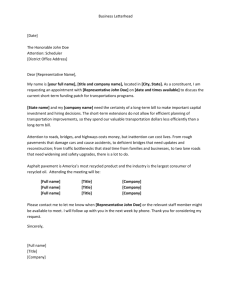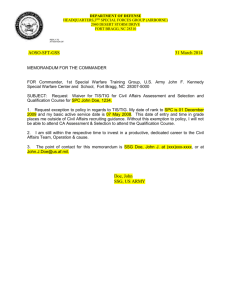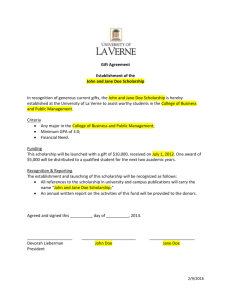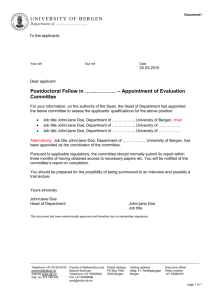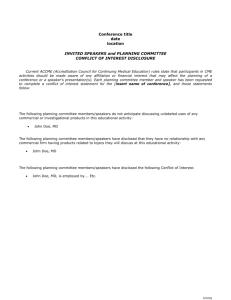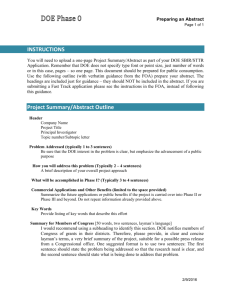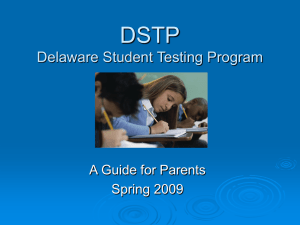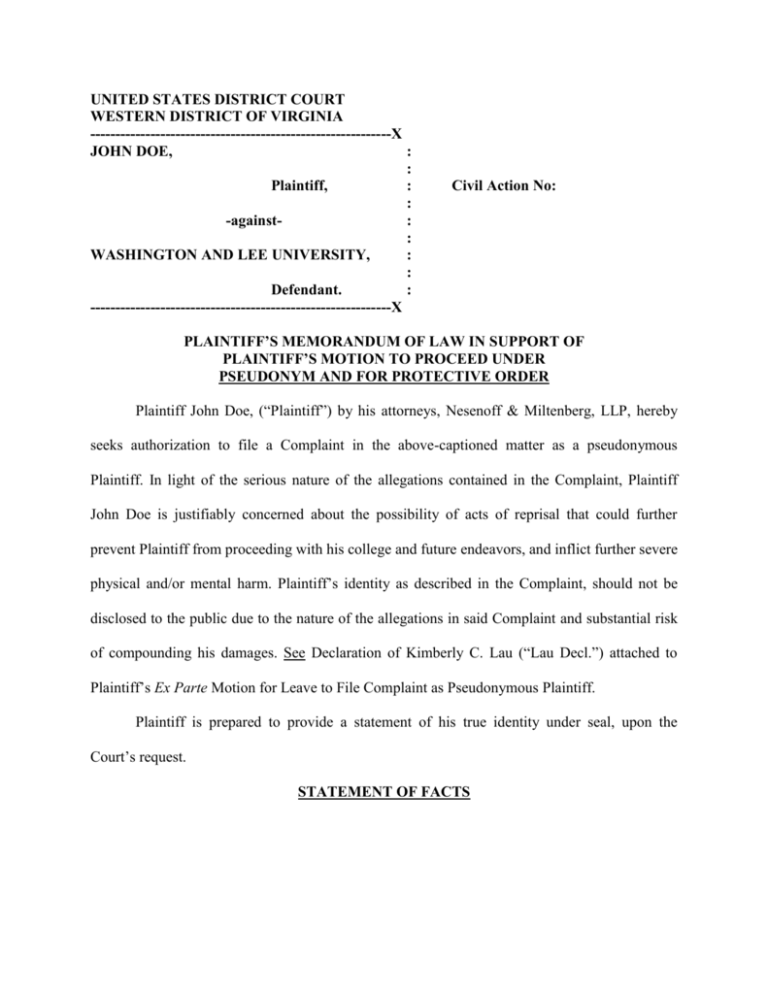
UNITED STATES DISTRICT COURT
WESTERN DISTRICT OF VIRGINIA
------------------------------------------------------------X
JOHN DOE,
:
:
Plaintiff,
:
:
-against:
:
WASHINGTON AND LEE UNIVERSITY,
:
:
Defendant.
:
------------------------------------------------------------X
Civil Action No:
PLAINTIFF’S MEMORANDUM OF LAW IN SUPPORT OF
PLAINTIFF’S MOTION TO PROCEED UNDER
PSEUDONYM AND FOR PROTECTIVE ORDER
Plaintiff John Doe, (“Plaintiff”) by his attorneys, Nesenoff & Miltenberg, LLP, hereby
seeks authorization to file a Complaint in the above-captioned matter as a pseudonymous
Plaintiff. In light of the serious nature of the allegations contained in the Complaint, Plaintiff
John Doe is justifiably concerned about the possibility of acts of reprisal that could further
prevent Plaintiff from proceeding with his college and future endeavors, and inflict further severe
physical and/or mental harm. Plaintiff’s identity as described in the Complaint, should not be
disclosed to the public due to the nature of the allegations in said Complaint and substantial risk
of compounding his damages. See Declaration of Kimberly C. Lau (“Lau Decl.”) attached to
Plaintiff’s Ex Parte Motion for Leave to File Complaint as Pseudonymous Plaintiff.
Plaintiff is prepared to provide a statement of his true identity under seal, upon the
Court’s request.
STATEMENT OF FACTS
1.
During the events described in the Complaint, Plaintiff was a student at Defendant
Washington and Lee (hereinafter “Defendant W&L” or “W&L”) and resided on W&L’s campus
(hereinafter referred to as the “Campus”) in Lexington, Virginia.
2.
Plaintiff seeks redress against Defendant W&L due to the actions, omissions,
errors, and the flawed procedures, and/or negligence and overall failure to provide Plaintiff with
an expected standard of due process concerning the wrongful allegations of sexual misconduct
made against John Doe, a male, a motivated and accomplished student at W&L with an
otherwise unblemished record. The unfounded allegations were made by fellow W&L student,
Jane Doe, a sophomore student at the time.
3.
In this case, John Doe, who was intoxicated himself, was punished for having
consensual sexual intercourse with a woman who, on her own accord, was intoxicated but “not
incapacitated,” initiated the sexual intercourse by initiating the “making out,” removed her
clothes, and had sexual intercourse with him. At least three witnesses observed Jane Doe in the
hours, next day and month after the incident and stated that “nothing indicated [] that anything
strange had occurred between them,” Jane Doe “didn’t insinuate that anything was wrong and
she made it seem as if it was consensual” and said she had a “good time last night,” and “there
never seemed to be anything wrong.” One month following the incident, Jane Doe sent an upbeat
Facebook message to John Doe and also engaged in consensual sexual intercourse again with
John Doe. Any other evidence introduced at the Hearing to support Jane Doe’s narrative that she
purportedly realized seven (7) months later that she did not engage in consensual sex on
February 8 was improper since (i) it contradicted John Doe’s account and other witness
statements to the contrary; and (ii) did not appropriately relate to a finding of “consent” under
W&L’s policies. In finding John Doe culpable of sexual misconduct, W&L afforded preferential
2
treatment to Jane Doe’s evidence on the basis of her female gender and engaged in sex
discrimination against John Doe in violation of W&L’s policies.
4.
During Plaintiff’s disciplinary process, W&L’s wrongful actions include the
following: (i) the lack of evidence that Jane Doe was unable to consent by reason of alcoholinduced incapacitation was so substantial that even charging John Doe with sexual misconduct
was improper; (ii) W&L failed to provide hearing materials to John Doe with adequate time to
prepare his defense; (iii) W&L developed the record of evidence inequitably by affording Jane
Doe’s evidence more latitude than that from John Doe; (iv) W&L neglected its obligations to
provide a trained and competent panel to handle cases of alleged sexual assault and/or allegations
of alcohol-induced incapacitation; (v) W&L knowingly employed a panel member with a clear
potential conflict of interest; (vi) the Committee Chair dismissed evidence undercutting the
credibility of Jane Doe’s claims, and refused to allow cross-examination to that end; (vii) the
Committee considered materially prejudicial evidence that was irrelevant to the charges against
John Doe, which distracted and confused the Committee’s decision-making; (viii) the
Committee’s decision failed to set forth a detailed factual finding for its determination that John
Doe was responsible for sexual misconduct, which deprived him of a meaningful right of appeal;
(ix) given John Doe’s written statement and supporting witness statements, W&L failed to
investigate the likelihood that Jane Doe had committed sexual misconduct while John Doe was
in an alcohol/drug-induced incapacitation, despite its affirmative obligation to respond to all
information pertaining to potential instances of sexual misconduct.
5.
Notwithstanding a paucity of direct evidence or practical good sense during the
investigatory process, Defendant W&L held a hearing on November 20, 2014 (“Hearing”) and
3
found John Doe responsible for “sexual misconduct” in the early morning of February 8, 2014
(“Decision”). As John Doe’s sanction, W&L expelled him (“Sanction”).
In W&L finding that Plaintiff was guilty of sexual misconduct, Plaintiff was deprived of
the most basic due process and equal protection rights and was discriminated against on the basis
of his male sex.
As a result of W&L’s actions, Plaintiff’s entire academic career has been ruined and,
without a college education, his overall economic future is completely compromised. John Doe’s
future career prospects have been put on hold indefinitely.
Without appropriate redress, the unjustified Sanction will continue to cause irreversible
damage to Plaintiff.
Revealing Plaintiff’s name will further compound his current damages in that his name
will be easily searchable and publicly available to future schools or employers.
Plaintiff seeks redress from this Court to undo the wrongs occasioned by W&L on his
education and future.
In light of these facts, Plaintiff should be permitted to protect his identity by filing the
Complaint under a pseudonym. Plaintiff is prepared to address measures to protect the
confidentiality of his identity should the Court require disclosure to Defendant or its attorneys at
a later stage in the proceedings.
ARGUMENT
Many federal courts have permitted parties to proceed anonymously when special
circumstances arise. Generally, courts allow the use of pseudonyms “[w]here it is necessary…to
protect a person from harassment, injury, ridicule or personal embarrassment….” U.S. v. Doe,
665 F.2d 920, 922 (9th Cir. 1977) (citing U.S. v. Doe, 556 F.2d 391, 393 (6th Cir. 1977)).
4
Courts “must balance the need for anonymity against the general presumption that
parties’ identities are public information and the risk of unfairness to the opposing party.” Does I
Thru XXIII v. Advanced Textile Corp., 214 F. 3d 1058, 1068 (9th Cir. 2000). This balancing test
generally allows plaintiffs to use pseudonyms in three situations: (1) when “identification creates
a risk of retaliatory physical or mental harm:” (2) “when anonymity is necessary to preserve
privacy in a matter of sensitive and highly personal nature:” and (3) when “the anonymous party
is compelled to admit [his or her] intention to engage in illegal conduct, thereby risking criminal
prosecution.” Id. Where plaintiffs seek the use of the pseudonyms to shield them from
retaliation, the following factors must be considered: (1) the severity of the threatened harm; (2)
the reasonableness of the anonymous party’s fear; (3) the anonymous party’s vulnerability to the
retaliation; (4) prejudice to the opposing party; and (5) whether the public’s interest would be
better served if the parties were identified. Id.
Courts have recognized that Doe status is appropriate in cases concerning alleged human
rights violations. Although reported decisions have not addressed the pseudonym issue directly,
it is clear that the plaintiffs in those cases were permitted to proceed using pseudonyms. See, e.g.,
Kadic v. Karadzic, 70 F.3d 232 (2d Cir. 1995) (two Jane Doe plaintiffs); Xuncax v. Gramajo,
886 F. Supp. 162, 170 (D. Mass. 1995) (one Juan Doe plaintiff); Doe v. Islamic Salvation Front,
993 F. Supp. 3 (D.D.C. 1998) (all plaintiffs proceeding as Does).
As in those cases, the Court should allow Plaintiff John Doe to employ a pseudonym
because he is alleging that they are responsible for his current and future reputation, and physical
and mental well-being. As demonstrated above, exposure of his identity will create a risk of
additional retaliatory harm to him.
5
The interests of Defendant and/or the public will not be harmed at this early stage of the
case if Plaintiff’s name is not revealed. Plaintiff and his attorneys are prepared to address
measures to protect the confidentiality of his identity should the Court require disclosure at a
later stage in the proceedings.
CONCLUSION
For these reasons and such other reasons as may appear just to the Court, Plaintiff John
Doe requests that his Ex Parte Motion for Leave to File Complaint as Pseudonymous Plaintiff be
granted.
Dated: Roanoke, VA
February 9, 2016
By:______________________________
David G. Harrison, Esq.
The Harrison Firm, PC
5305 Medmont Circle, SW
Roanoke, VA 24018-1120
(540) 777-7100
david@harrisonfirm.us
-andAndrew T. Miltenberg, Esq.
Kimberly C. Lau, Esq.
Nesenoff & Miltenberg, LLP
363 Seventh Avenue, Fifth Floor
New York, New York 10001
(212) 736-4500
amiltenberg@nmllplaw.com
klau@nmllplaw.com
(pro hac vice to be applied for)
Attorneys for Plaintiff John Doe
6

